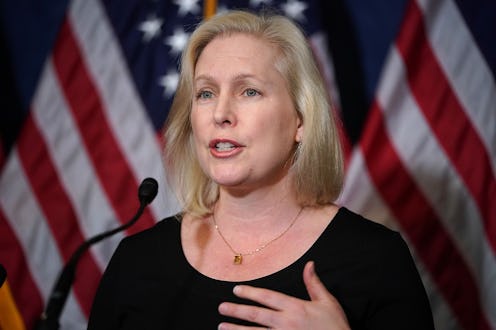News
Congress Has A Sexual Harassment Problem. Kirsten Gillibrand Thinks She Can Solve It

In the aftermath of Hollywood mogul Harvey Weinstein being accused of sexual harassment, assault, and rape by scores of women (Weinstein denies all allegations of non-consensual sex), the national conversation has fixed itself on the matter of powerful men who sexually abuse and exploit the women around them. Over the past week, female lawmakers have joined the conversation, too: Women in Congress are trying to change sexual harassment culture on Capitol Hill, and Sen. Kirsten Gillibrand of New York is among those taking center stage in the efforts.
On Friday, Gillibrand announced she'll be introducing a bill aimed at combating sexual harassment in Congress, mostly by way of revamping the role of the Office of Compliance. Specifically, Gillibrand's bill would make the office's voluntary sexual harassment training a mandatory program starting next legislative session, and would establish a new role in the office, a confidential adviser that members of Congress can speak with when they've been sexually harassed.
Gillibrand has for years been a vocal leader of the fight against sexual assault, particularly in the U.S. military and in American colleges. This latest example is the first time she's proposed a bill addressing that sort of conduct from her own colleagues in the House and Senate, however.
Gillibrand's office tells Bustle it's been examining legislative means to address sexual harassment and sexual assault in Congress for more than a week. Its consideration comes partially in response to an ongoing slew of high-profile media reports implicating powerful and prominent men.
The New York senator's office also notes that Gillibrand hopes to find a place of bipartisan agreement on the bill ― a tall order in a time of staggering polarization ― and credits her past work successfully reaching across the aisle regarding sexual assault in the military and on college campuses.
Although combating sexual assault and harassment in institutions chock-full of everyday Americans is a very different task from convincing lawmakers to reform their own institution, it's clear that Gillibrand doesn't regard the fundamental issue any differently. As she said in a statement on Friday, she's hoping to create a system in which women in Congress ― particularly staffers, who have far less power and visibility than actual elected officials ― don't have to worry that their careers will be over if they speak out. Said Gillibrand:
What you see time and again in institutions all around the country is a culture where power and fear keep sexual assault and sexual harassment in the shadows. Congress is no different. ... We must ensure that this institution handles complaints to create an environment where staffers can come forward if something happens to them without having to fear that it will ruin their careers.
Gillibrand's announcement comes the same morning as four more current and former women in Congress went public with stories of sexual harassment. The women in question are former Reps. Mary Bono and Hilda Solis, former Sen. Barbara Boxer, and current Rep. Linda Sanchez. None of these women opted to name their harassers.
The big question is whether there will be a partisan split in reactions to Gillibrand's bill, and if it manages to pass, whether it'll be signed into law by President Donald Trump. The president, after all, has himself been publicly accused of sexually predatory behavior by more than a dozen women; he has denounced and denied all the allegations against him, describing his many accusers as "horrible liars."
One of the women he allegedly groped, Summer Zervos, is currently suing him for defamation over his denials ― Trump claimed last year that he had "never met her at a hotel or greeted her inappropriately a decade ago," and only "vaguely remembered her." Last week, White House Press Secretary Sarah Huckabee Sanders confirmed that the administration's official position is that all Trump's accusers are lying.